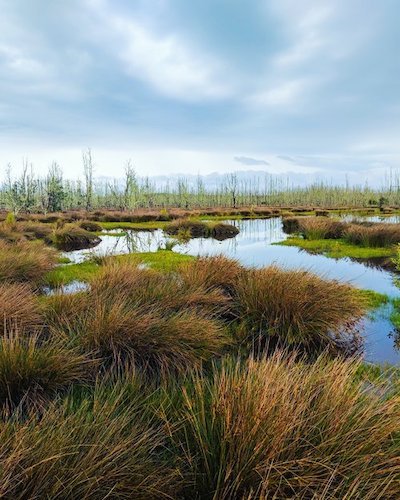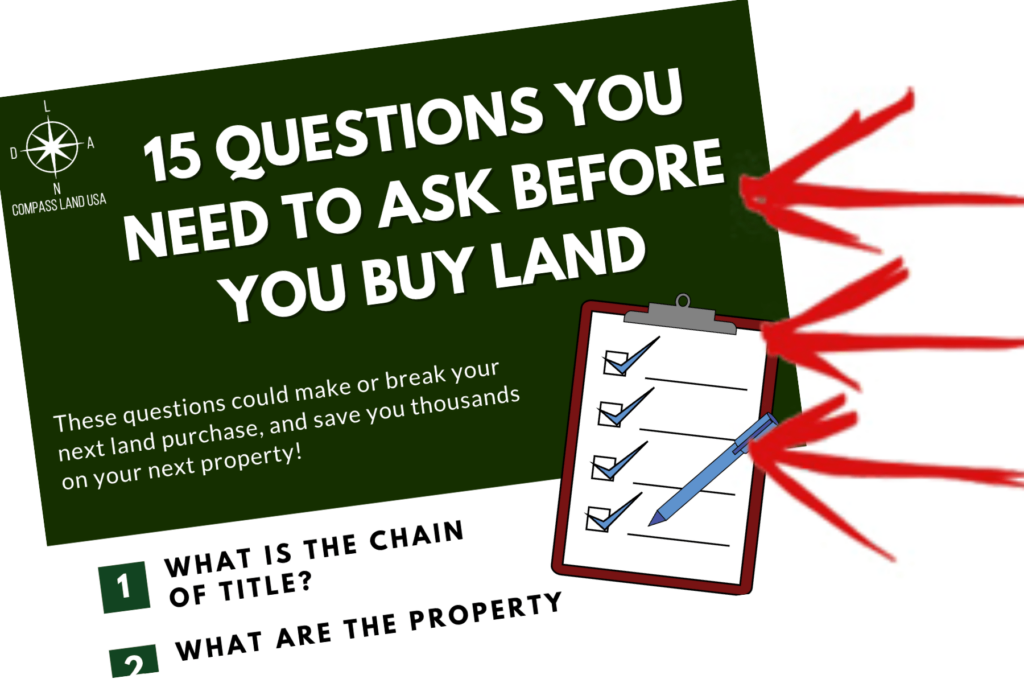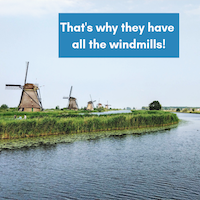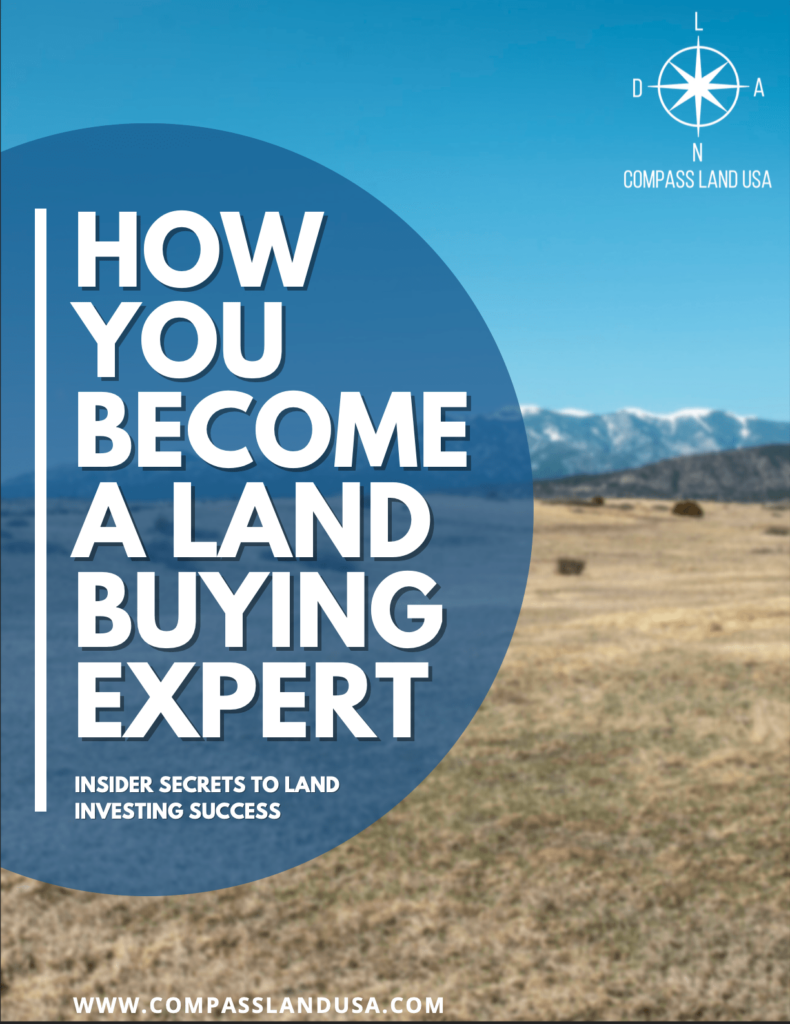
What are Florida wetlands? Where are Florida wetlands located? Where are Florida flood zones located? Read this before you buy land in Florida.
If you’re planning on buying land in Florida, or are wondering how to buy land in Florida, you need to know a couple things – specifically the concerns about flood zones and wetlands. Are you now thinking, what are wetlands? Keep reading, this article could save you thousands of dollars and total heartbreak. (If you’re looking for a Florida land buying checklist, you can find one here 🙂 )
Quick Overview – Why Buy Land?
Investing in land and buying land is not a well-understood concept. Most people don’t know for sure how land buying works. And even fewer people understand how investing in land is a smart strategic move for diversifying your portfolio. You don’t want to be one of these people.
No one is talking about why land is a great investment. That presents you with a fantastic opportunity.
Here are 3 big reasons why people are buying land:
- Land is a finite resource – there’s only so much of it!
- Land is a tangible resource, it can’t disappear like stock or shares.
- Land is affordable! You can owner finance any of our properties for sale.
If you’re looking for more, here are 9 more reasons why land is such a great investment.
So, now that you’re convinced buying land is a great idea (*wink*), you’ll be happy to know that you don’t need a realtor or broker, and there isn’t a mountain of paperwork to go through.
You Can’t Control the Weather
We buy a lot of land in Florida, and you shouldn’t let flood zones or other water issues scare you off from investing and buying land there. It’s just like buying land anywhere else, you need to do your research on the lot before you buy.
Every state has natural concerns you need to be wary of. If you’re up in the northeast in areas like New York, Vermont, or Maine and you decide to buy a secluded lot, you may not be able to access it during the winter months because of all the snowfall.
If you’re in the west coast in a state like California, you might be worried that your piece of rural land could be subject to seasonal forest fires (which have gotten pretty bad over the last couple of years!).
If you’re in the Gulf Coast and southeast states you need to be wary of hurricanes, and the resulting flooding. If you’re in middle America you probably need to be cautious about tornadoes. There’s something to watch for in every state and season. That’s why due diligence and research on a property before you buy it is so important.
Questions to Ask Before You Buy Land
At Compass Land USA, we do extensive due diligence on all properties before we purchase them. If you decide to try and purchase a property yourself, you should start your research and due diligence process with the following 15 questions (you can find more in-depth explanation of the questions and why they’re important here):
- What is the Chain of Title? In other words, do you know who the buyer is? To determine if the property has a clear and concise title chain, you should always start by asking the seller to send you a copy of the deed. If they don’t have the deed on hand, you can check on the county’s website for the deed history.
- What are Property Back Taxes? Once you’ve concluded who owns the parcel, your next step is to confirm the amount of back taxes, liens, or debts owed on the property (if any).
- Is the Property in an HOA or POA? When you buy land, it’s important to know if the property you are going to purchase is part of an HOA/POA because they usually have an annual fee and their own restrictions and property use rules to be aware of.
- What is Property Zoning? Is the lot buildable? What other construction is planned or possible on the surrounding land? Is this property agricultural, residential or commercial?
- What Can You Use the Land For? The most common classifications of vacant land are recreational, residential, and undeveloped. It’s pretty important to follow the zoning requirements and HOA/POA rules.
- Does the Property Have Utilities? It’s not common for vacant and rural properties to have utilities. If the property is part of a developed subdivision, chances are it will have access to at least power and water, but there will be a connection fee for activating them.
- What Property Taxes do You Pay? Land is less expensive to hold over a long-term than most other real estate assets, like townhomes or apartment buildings. You still have to check the amount of annual property taxes before you buy it. You as the owner will still be responsible for property taxes.
- Does the Land Have Common Facilities? It’s rare, but sometimes there are common facilities (water, septic, road, etc.), or common property that the homeowners or developer will need to manage.
- How to Access the Property? Rural properties are great, and a lot of people really value the privacy they offer. But sometimes, these properties don’t have legal road access. That means you would technically have to trespass on a neighbor’s lot or on a private access route to get to your land.
- Is the Property Where Wetlands Are Located? Wetlands don’t generally appeal to land buyers and investors. They’re either seasonally or permanently saturated with water and will contain marshes and swamps. We’re going to get more into wetlands below!
- What is Property Size? It’s crucial to understand the size and shape of the parcel. It will let you know how much “stuff” you can build, or how much space you have to roam.
- Is the Land Near a Conservation Easement? A conservation easement is a restriction placed on a piece of property to protect its resources. It’s is a legally binding agreement that can limit the landowner from planting, clearing, or hunting on certain areas of land.
- Who Owns Mineral Rights to My Property? Mineral, Timber, and Water Rights to the land are often owned separate from the land itself. Here’s some information for you on how Mineral Rights work.
- Are There Any Water Features? A water feature can refer to a river, creek, lake, spring, pond, stream – a body of water that already exists on the property. A water feature can potentially increase the value of the property, or if it’s a wetland or marsh, potentially decrease the value.
- Who are Your Neighbors? Who are the neighbors surrounding your lot? If you had to sell this property again in a year, is it desirable to other potential buyers?

Want Your Own Copy of the Land Buying Checklist?
You can get yourself it for free – just fill out the form below!
What to Watch for with Florida Land
If you’ve gone through those 15 questions for your potential property, you’re in pretty good shape! But, as we mentioned before there are some state-specific things to watch for. When buying land in Florida, flood zones, wetlands, and floodways are something you need to be aware of.
Technically the entire state of Florida is a flood zone because it’s located so close to sea level. Obviously there are areas that get more water than others, but in a lot of Florida, you’re going to experience standing water after heavy rainfall. So buying land that’s in a designated flood zone isn’t necessarily a terrible thing.
Florida Wetlands and Buying Land
Let’s look at wetlands first. Wetlands are a marsh or swamp-like ecosystem, where the soil is always covered by water. Have you ever heard the saying God created the world, but the Dutch created the Netherlands?

The Netherlands is below sea level, almost all of it could be wetlands, but the Dutch are constantly pumping water moving water back to the ocean. This will be your life if you try to build on wetlands in Florida. You will constantly be fighting backwater, and it will be very expensive to mitigate that water elsewhere.
You also have to watch out for damaging existing wells by building on wetlands, In that case, you would have to get special permits from the county and that a lot of work. Unless you are head over heels in love with the property, I don’t recommend buying property designated as wetlands.
You can check on the US Fish and Wildlife Service website map with the address of the property to see if it’s in wetlands – click here for the mapper.
To use the mapper, click on the ‘Wetlands Mapper’ link at the bottom of the page. Accept the terms and conditions presented to you to use the map. After accepting the terms, you can search for a specific location or address on the map, for example, Okeechobee, FL, USA. Click ‘Legend’ on the right-hand side of the page to see all the defined wetlands in the area, ranging from Riverine, Lakes, Freshwater Ponds, and Deepwater.
Florida Flood Zones and Buying Land
Flood zones are different. Flood zones are described by the 1% annual chance of flooding or a 1 in a 100-year flood. There are different zones as described by FEMA. Zone X has the lowest level of risk for flooding, whereas properties in Zone A or Zone AE are considered to have a high risk of flooding.
You can easily check on the FEMA Flood Map or county GIS map to see which zone the property is in. To use the FEMA Flood Map, search for an exact address or a location, for example, Okeechobee, FL, USA. You can download the maps and see any published revisions or amendments. You will also see areas labeled on the map such as ‘Area of Minimal Flood Hazard’, ‘Zone AE’, ‘Zone A’, etc.
To use a county GIS map, start by searching Google for the county, for example, Charlotte County GIS map. You can find this map here. This only works if you know what county your property is in – you can quickly check this on your deed if you don’t remember.
You will have to search for the specific address of your property (like 3 Main Street), instead of a broad area (like Okeechobee). Go to ‘Layers’ at the top right-hand side of the map and select ‘New FEMA Flood Zones’. Make sure you have the legend visible. You can then see if your property is in a flood zone, and which zone it is.
Note: Every county GIS mapping system is different, so the verbiage might vary. If you have trouble using the county’s GIS, you can give them a call for help walking through it.
It’s not a terrible thing to buy land in a flood zone, because you’ll recall that’s technically all of Florida. Just know what zone you’re in because it’s easier to get insurance for low-risk flood zones than for high-risk flood zones. You might also want to bring in fill dirt if you find out you’re in a more severe flood zone area.
Florida Floodways and Buying Land
The final water-related issue we’re going to go over is regulatory floodways. Floodways describe the watercourse and the adjacent lands that must be preserved to help mitigate flood water and keep the water from reaching a certain height.
What does this mean? It is extremely difficult to get the approval to build or modify regulatory floodways and the land included in that.
You would need special permits and engineering consultation, and more often than not, structures are not allowed to be placed in a floodway area. These rules will vary by county. You should contact the Planning and Zoning Department to get more information.
Plus the insurance would be incredibly expensive because if there is a surge in floodwater, it’s going to be at the floodways first. So floodway land should definitely be avoided, if possible.
Bottom Line on Buying Florida Land
Always do your due diligence before buying land! There are always things to watch out for.
When buying land In Florida, key things to watch out for are floodways, flood zones, and wetlands. A floodway is not your ideal case, I recommend avoiding buying this type of property, or if you can’t avoid it, have an in-depth discussion with the county and make sure you understand the consequences.
A wetland is a marsh or swamp-like environment, not impossible to build on, but you’ll be doing it for the rest of your life, like the Dutch systems in the Netherlands. You can use the US Fish and Wildlife Service mapper to check if there are wetlands on or near your property.
Flood zones are not a complete turn-off, you just need to be aware of which zone you are in and what that means for insurance policies. You can use the county’s GIS map or the FEMA flood mapper to find out if your property is in a flood zone.
These 3 issues are pretty important in Florida. You can easily find all this information by doing your due diligence before you purchase a property.
When you purchase a property through Compass Land USA, we do all this due diligence for you. So you don’t have to worry about these 3 issues. I hope this helped you understand what you need to know about buying land in Florida.
If you have any questions about the process of buying land you can leave a comment below. I’d be happy to go over this process with you and address any questions you have. I look forward to hearing from you!
Are You Looking for More Info?

How You Can Become a Land Buying Expert – Download our FREE Guide here. Or, you can feel free to contact us anytime if you have questions, want to easily and safely buy land, or want to just learn more about how we can help people like you search for land as an investment.
Get the FREE Guide and then give us a call at (313) 349-0434 and we’ll discuss how you can easily buy land with little money using our automatic approval owner financing.
Common search phrases for Buying Land in Florida:
- Is buying land in Florida a good investment
- Free land Florida
- Government land for sale in Florida
- Free land Florida 2018
- Buying vacant land Florida
- Land for sale in Florida under 5000
- Waterfront land for sale in Florida
- Land for sale in northwest Florida



looking for 10 to 20 acres of land good for meditation ground or a open ground yoga center. very low budget as this is not an investment and services offered will be free to the local public, Thanks,
Hi Ravi! I think that’s a great idea! Perfect location for a year-round yoga retreat. Unfortunately, we don’t have any land right now of that size in southern Florida. If you wanted, you can subscribe to our weekly newsletter to make sure that you’re the first to know of all our newest properties. Good luck with your search!
Hi,
I am a Pakistani national based in Qatar. Am I legally allowed purchase a vacant land while being overseas?
I do NOT have a US-visa of any sort.
Please advise.
Adnan
Hi Adnan. Great news for you – you can legally buy land in the US! You do not need a visa to buy land in the US. If you have questions about a specific property or how the land buying process would work for you, you can send me an email at sales@compasslandusa.com and we’ll go over it together. Cheers!
Hi,
I live in California and like to buy a cottage in FL. Which option is more affordable, buy an vacant lot and build a house OR buy a house from the market?
Thanks,
Alvin
Hi Alvin! That depends, whereabouts are you hoping to have a cottage in Florida?
Hello Felicia, This is Jyothi. We are looking to buy land (around 10 acres) in Plant Hardiness zones 10 A or 10 B in Florida. We have seen one land parcel of 12 acres (about 3 miles from ocean) but not water front (no canals, rivers etc). Around 4 acres of the land is wetlands (code PEM1C). What are the restrictions for the wetlands in this code? Can we use the wetland land part for agriculture purpose i.e can we clear the land and plant any trees? Also this wetland part is in flood zone AE with base of 11 ft. I think the rest of the land is in Zone X (not sure whether it is shaded unshaded).
Hi Jyothi! Thanks for reaching out. Unfortunately, I don’t think I can give you a straight answer in this because we don’t typically work with Plant Hardiness zones, and I’m not sure if you could implement that on a wetland.
I will give you this suggestion though – If you have a specific property in mind that you own or are looking to buy, write down the parcel number, and give the County that the property is located in a call. I would try the Planning and Development or Zoning department first. They should be able to tell you what can be done with wetlands, what precautions and permits you would need to go through to modify it, and if you can use it for agricultural purposes. If they don’t pick up, leave a voicemail. Most counties are pretty good with getting back to people :).
I hope this helps! Good luck with your land search!
Very informative page! I loved it!
I have a question after analyzing some lots.
– If a lot that I am interested in is located in an area that is ZONE X in the Flood Zone MAP but next to it there are a big land that is ZONE A and Freshwater Forested/Shrub Wetland. Would you recommend to buy it? Considering that all those maps shown those areas in the next lot in front. Non of them are directly in the lot to be bought.
Hi Juan. Thanks for reaching out! If I were you, I would check out the slope of these two properties. Does the Zone A property slope downwards into the property you’re looking to purchase? Or is it the other way around? That will help you figure out which direction water will flow, and help you make a decision on whether or not you’re comfortable purchasing. Hope this helps!
Hello Felicia,
I am looking to move to Florida, and is looking for maybe an acres to build a waterfront home may be in the south. Any recommendation or information I could dig deeper.
Thank you
Hi Liam! Cool! Florida is a really popular destination, especially for people looking to do away with winter weather. If you’re looking for waterfront acreage, you could try checking out websites like ruralvacantland.com or landmodo.com. You can also keep an eye on our listings – waterfront property is rare, and when we do get it, it sells fast! Good luck with your search!
I’m trying to buy a lot in North Port, FL and it looks like it has sand on it so does anyone know if that would be an issue for building a house there? Is that common in FL?
Hi Vitaliy! That could be common, especially in Southwest FL. You could try giving an engineer at the county’s Building Office a call, as well as local builders to the area. Both will be able to tell you if there are any potential building issues. Hope this helps!
I am interested in buying a lot within reasonable driving distance to Tampa. I would like at least 5 acres and plan to build a solar powered house but would also like to be connected to the electrical grid.
Sounds like a great idea John! It might be tricky to find 5 acres driving distance to Tampa – try looking at sites like landflip.com. Good luck!
I am looking to purchase in collier county FL and I am trying to do my due diligence. What steps do I need to take to find out if this property is actually on a wet land. While looking a the usgs map it seems to be in Freshwater Forested/Shrub Wetland, can i build on this ? Who do I contact about getting exemptions to build on that wet land. I just dont want to buy and find out i have all this restrictions on where and how i can build.
Hi Drew! Your best bet is to call Collier County’s Planning and Zoning department. They’ll be able to tell you what exemptions are needed, how to remove a property from a wetlands (be careful – this is really expensive!), and any other restrictions that may apply to the property you’re looking to purchase. Hope this helps!
Hello , I’m looking for land as an investment for a 5 years term.
Meaning I wish to get something I can sell in less than 5 years.
Hi Pedro! You can definitely achieve that. If you’re looking at a 5 year turn around time, I would suggest looking for land near a metropolitan area, somewhere you can bet there will be growth or expansion to. I hope that helps!
I am currently traveling throughout the US using airbnbs to visit other states. I have no permanent address at this time. I was wondering if I buy land in Florida can I use it as my permanent address and register my car in Florida? As eventually I hope to move and settle in Florida.
Hi Mark. Sounds like you’ve got a cool things going on there! Truthfully – I’m not sure. I don’t know if you could make a property a permanent residence if there’s no residence on it. Sorry I couldn’t be of more help. Have fun on your travels!
We just started looking to purchase a buildable lot in an established neighborhood that we can build in 15 yrs when we retire. We are feeling overwhelmed in choosing an area that will suit our needs as most vacant land online all looks the same after a while. So far we have been looking in the Punta Gorda and Port Charlotte areas but we are open. Do you have any tips for us, ideas on where we can start, or suggestions on areas that you recommend or do not recommend?Feeling lost dazed and confused in our search!
Hi Gary! Punta Gorda and Port Charlotte are great areas to be! They’re built up, lots of shopping, golf courses, clinics, and nearby hospitals. They’re also great for water access and outdoor activities.
In terms of where to start. I would suggest you make a list of the things you want access to when you’re retired. This should help you narrow down the area/city. From there, you can search for properties within that city that is in your desired price range. You can narrow your search further by looking for lots with utilities.
If you want to chat with us more about your search, you can call or text my sales manager, Mark, at (313) 349-0434. He’ll be happy to help you! 🙂
We are looking at a 6 acre property of that 1 acre is wetlands. It is also partly in flood zone A. We’ve gotten a report showing exactly where the wetlands are. Is building with a high foundation a solution or should we avoid this completely?
Hi Amy! Honestly, this isn’t our area of expertise. We rarely develop or build on our properties. From my limited knowledge, building with a high foundation could work. Have you had an engineer evaluate the property yet?